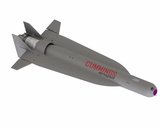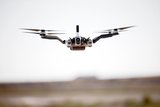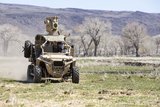Rockwell Collins awarded new damage tolarance contract from DARPA
Rockwell Collins has been awarded the third phase of a damage tolerance contract by the Defense Advanced Research Projects Agency (DARPA).
Under the contract, Rockwell Collins will demonstrate completely autonomous takeoff, recovery from extreme damage and failure, and autonomous landing of an unmanned subscale F/A-18. Additional flight tests will be conducted on an operational Unmanned Aircraft System (UAS).
Over the course of approximately 15 months, Rockwell Collins will demonstrate its full Damage Tolerance and advanced controls capabilities.
Flight tests will demonstrate increasing damage to both the subscale F/A-18 and an operational UAS, including the failure of control surfaces and parts of the wing, as well as loss of vertical and horizontal tail surfaces. The flight tests will also include an “engine-out” condition followed by automatic adaptive recovery and emergency autoland.
“In addition to demonstrating increased reliability of unmanned aircraft, the damage tolerance work we are doing with DARPA goes a long way in facilitating evolving applications for UAS and the safe coexistence of manned and unmanned aircraft in common airspace,” said Dr. David Vos, Senior Director of Control Technologies for Rockwell Collins. “Unmanned aircraft reliability in the battlespace will ensure that U.S. and Allied forces receive real-time high quality Intelligence, Surveillance and Reconnaissance (ISR) data.”
“This next phase of the Damage Tolerance program will demonstrate that technology exists to reliably control UAS operating under the most challenging conditions such as extreme damage, upset or failure,” said DARPA Program Manager James McCormick.
Damage Tolerance Phase III follows Phases I and II, which were completed in April 2008. In Phase II, the technology demonstrated an aircraft could survive catastrophic wing damage, recover its baseline performance, and safely land – all autonomously.
More from Uncrewed Vehicles
-
![Cummings Aerospace showcases Hellhound loitering munition designed for US Army’s LASSO programme (video)]()
Cummings Aerospace showcases Hellhound loitering munition designed for US Army’s LASSO programme (video)
Cummings Aerospace presented its turbojet-powered Hellhound loitering munition at SOF Week 2025, offering a man-portable solution aligned with the US Army’s LASSO requirements.
-
![SOF Week 2025: PDW unveils attritable FPV drone for SOF operations at scale]()
SOF Week 2025: PDW unveils attritable FPV drone for SOF operations at scale
PDW has revealed its Attritable Multirotor First Person View drone at SOF Week 2025, offering special operations forces a low-cost, rapidly deployable platform for strike and ISR missions, inspired by battlefield lessons from Ukraine.
-
![SOF Week 2025: Teledyne FLIR white paper provides guidance on reusable loitering munitions]()
SOF Week 2025: Teledyne FLIR white paper provides guidance on reusable loitering munitions
Teledyne FLIR is highlighting the emerging requirements for 'recoverable and re-usable' loitering munitions across the contemporary operating environment during this week’s SOF Week conference in Tampa, Florida.
-
![SOF Week 2025: Kraken Technology group debuts K3 Scout USV in North America]()
SOF Week 2025: Kraken Technology group debuts K3 Scout USV in North America
High-performance maritime industry player Kraken Technology Group, based in the UK, has used the SOF Week conference in Tampa, Florida this week to debut its K3 Scout uncrewed surface vessel (USV) to the North American market.
-
![Palladyne AI and Red Cat to demonstrate capabilities for autonomous drone swarms to the US military]()
Palladyne AI and Red Cat to demonstrate capabilities for autonomous drone swarms to the US military
Red Cat and Palladyne AI recently conducted a cross-platform collaborative flight involving three diverse heterogeneous drones.
-
Jammer resistant drone designs spark search for countermeasures
The Russia-Ukraine conflict has driven another stage of evolution for drones and the counter measures to defend against them.

























